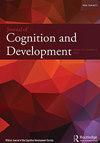Direct Assessments of Social Skills Can Complement Teacher Ratings in Predicting Children’s Academic Achievement
IF 2.1
2区 心理学
Q3 PSYCHOLOGY, DEVELOPMENTAL
引用次数: 0
Abstract
ABSTRACT The present research evaluated whether behavioral tasks (“direct assessments”) commonly used to assess young children’s social cognitive development in laboratory studies could have utility for measuring and predicting U.S. children’s outcomes in educational contexts. To do so, children (N = 95; 49 boys, 46 girls; 41.05% White, 16.84% Hispanic, 14.74% Black, 13.68% Asian, 11.58% Multiracial, 2.11% American Indian/Alaska Native) in a publicly funded pre-kindergarten (4K) program in the United States completed 9 direct assessments that capture important skills in early childhood (e.g., task switching, group conformity preference, theory of mind). The school district also provided children’s 4K and kindergarten grades (assessed through teacher ratings of children) to evaluate whether direct assessments had additional explanatory power over-and-above existing metrics of children’s aptitude. Across the direct assessments, children’s group conformity preferences (i.e., the extent to which children preferred members of the same group to behave in the same way) were most reliably correlated with concurrent (4K) and predictive of future (kindergarten) grades, even when controlling for teacher ratings of children’s concurrent performance. Interestingly, teacher ratings of children on each assessment loaded onto a single factor despite the intention to capture theoretically distinct components of children’s school performance. Discussion focuses on the implications of direct assessments in educational contexts and critical areas for future research at the interface of psychology and education.社会技能的直接评估可以补充教师对儿童学业成绩的预测
本文章由计算机程序翻译,如有差异,请以英文原文为准。
求助全文
约1分钟内获得全文
求助全文
来源期刊

Journal of Cognition and Development
Multiple-
CiteScore
4.00
自引率
0.00%
发文量
29
期刊介绍:
The Journal of Cognition and Development is the official journal of the Cognitive Development Society (CDS). Some CDS members are concerned with basic research or theory; others focus on policy issues and practical applications. The range of interests includes cognitive development during all stages of life, and we seek to understand ontogenetic processes in both humans and nonhumans. Finally, their interests encompass typical as well as atypical development, and we attempt to characterize both biological and cultural influences on cognitive change and continuity.
 求助内容:
求助内容: 应助结果提醒方式:
应助结果提醒方式:


